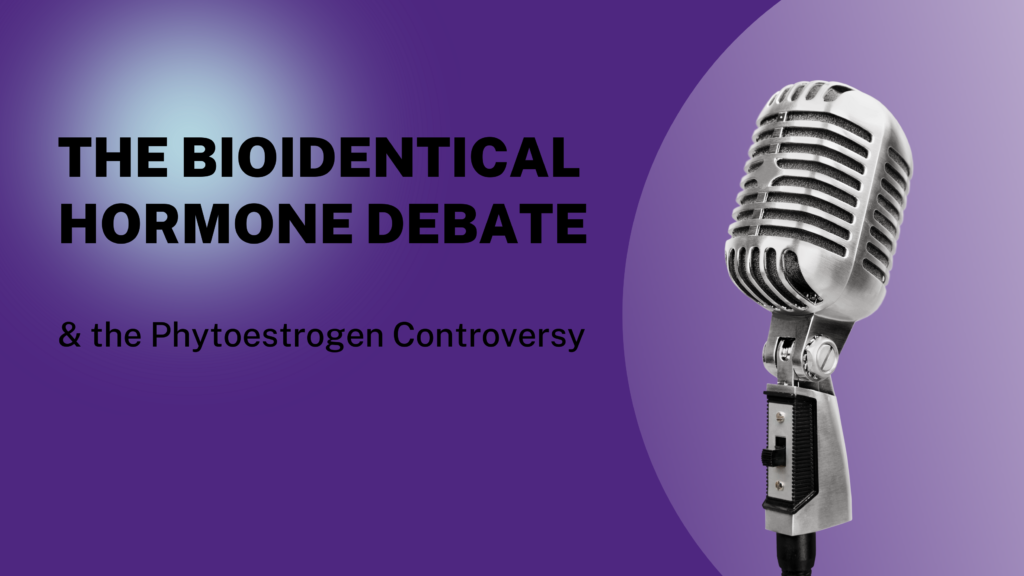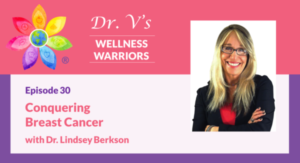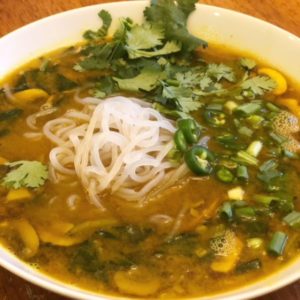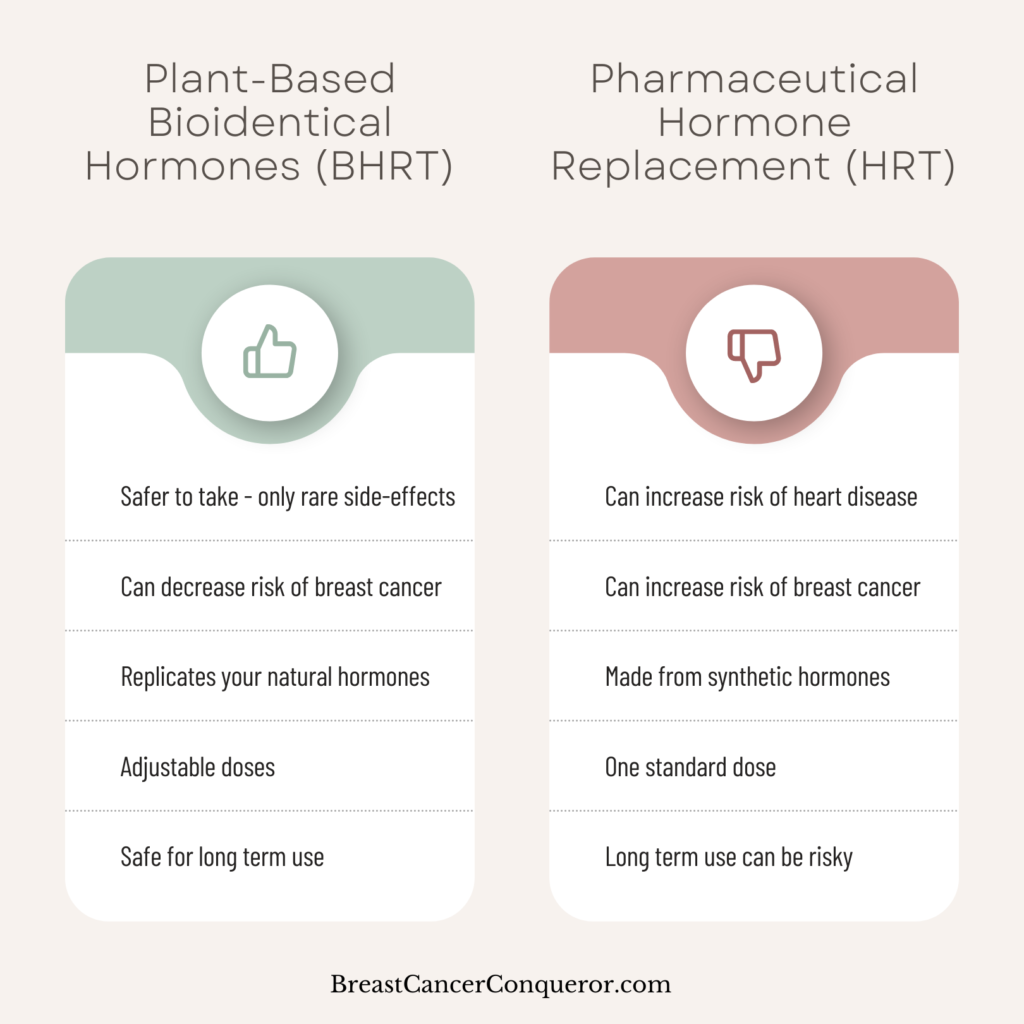
We all know what it is like for our hormones to be out of wack. We feel it, and so does everyone around us! Not a pretty picture. Over the years, I have seen a pattern emerge again and again: estrogen dominance and not enough natural progesterone. This imbalance leads to a wide range of dis-eases and distress. Balancing your hormones isn’t just essential for preventing mood swings and hot flashes. It is also critical for preventing serious health concerns such as polycystic ovarian syndrome (PCOS), Endometriosis, pre-mature aging, and potentially breast cancer.
Many friends and medical professionals will tell you to take hormones, but not all hormones are created equally. Read on to learn about the different types of hormones, if they are safe for breast cancer conquerors to take, and what your next steps could be.
What are Bioidentical Hormones?
There are a few very different types of bioidentical hormones on the market. Sadly, there is tremendous ignorance in the traditional medical community regarding bioidentical hormones. Below, I will share the experts I trust, research, and knowledge.
Before we get started, please note that you should never take any hormone without consulting a trusted doctor and testing. To properly balance your hormones, saliva testing is your best option. . Read more about testing options and which hormones to test in this blog post.
Pharmaceutical Hormone Replacement (HRT)
(Note: I do NOT recommend HRT) HRT is made from synthetic hormones (actually made from the urine of a pregnant horse!!) It is sadly the go-to for millions of women in the US. Long-term studies (since the 1990s) have found evidence of their link to breast cancer and heart disease.
The biggest study was the Women’s Health Initiative clinical trial (WHI, 1993-1998). The WHI was designed to “assess the major health benefits and risks of the most commonly used combined hormone preparations in the United States.” It was supposed to go for 9 years. After 5 years, the researchers abandoned the study because heart disease and breast cancer rates among the women were so high. A review of the WHI data was published in 2013 by the National Institutes of Health. The report stated that “[r]ates of overall illnesses…and death were 12 percent higher in women taking estrogen plus progestin than in women taking placebo pills during the trial.” The NIH still recommends HRTs for short-term use, despite dozens of current studies that continue to connect HRTs and breast cancer.
Plant-based Bioidentical Hormone Replacement Therapy (BHRT)
This is a very personal choice you make. Work along side your doctor after reviewing your symptoms and test results.) BHRT are topical creams as well as homeopathic remedies which gently stimulate and replicate your body’s unique hormonal balance. They can provide relief, disease prevention, and hormone balance with no side effects. For the women I work with, I also suggest using topical and vaginal products versus injecting hormone pellets.
The 12-year long Fournier Study involved over 80,000 women and found no evidence of increased breast cancer risk when using Bioidentical Hormone Replacement Therapy, using estrogen in conjunction with natural progesterone. In fact, women using BHRT had a 10% decrease in breast cancer risk! BHRT best works when combined with a healthy breast lifestyle of quality sleep, food, energy balance, and exercise as part of the 7 Essentials System®.
Are Bioidentical Hormones safe for breast cancer conquerors?
 As stated before, taking hormones is a personal choice between you and your doctor. During my second healing journey, I consulted with Dr. Lindsay Berkson. Dr. Berkson is a Hormone Scholar, Nutrition, and Gut Health Expert. She has been in practice as a nutritionist since the mid-1970s and an integrative nutritional/gastrointestinal endocrine specialist since the early 1980s. As a Breast Cancer Conqueror herself, Dr. Berkson specializes in complex cases, high-risk hormonal patients, and severe gastroenterology cases trying to avoid surgery. Berkson knows how to connect the dots of cutting-edge research and has a large background of personal clinical experience with success in difficult cases to pull from.
As stated before, taking hormones is a personal choice between you and your doctor. During my second healing journey, I consulted with Dr. Lindsay Berkson. Dr. Berkson is a Hormone Scholar, Nutrition, and Gut Health Expert. She has been in practice as a nutritionist since the mid-1970s and an integrative nutritional/gastrointestinal endocrine specialist since the early 1980s. As a Breast Cancer Conqueror herself, Dr. Berkson specializes in complex cases, high-risk hormonal patients, and severe gastroenterology cases trying to avoid surgery. Berkson knows how to connect the dots of cutting-edge research and has a large background of personal clinical experience with success in difficult cases to pull from.
As Dr. Berkson plainly puts it, “Hormones are the most misunderstood genre of medicine. It is the ignorance of many (not all!) people in the medical community.” New research on hormones is often not even discussed in medical school or future educational training. Please take 28 minutes to listen to my podcast episode with Dr. Berkson. Then, check out her website for the latest research, hormone tests, books, community programs, and consultations.
The European Menopause Journal published an article about the differences between synthetic and bioidentical hormones. The authors concluded: Compelling indications also exist that differences might also be present for the risk of developing breast cancer, with recent trials indicating that the association of natural progesterone with estrogens confers less or even no risk of breast cancer as opposed to the use of other synthetic progesterone.
What does Phytoestrogen have to do with this?
Soy products are very misunderstood and have also been on the debate radar. Just like hormones, not all soy products are created the same and not all have cancer-blocking benefits. Soy phytoestrogens occupy the Immune Building Receptor Sites (ER-b) and provide potent cellular immunity. It is also a great radiation reducer while providing nourishing iodine for the thyroid and reproductive organs.
In Walter Wainright’s research, he found, “The reduction of ER-a sites (the more aggressive estrogen sites) by the consumption of fermented, whole soy, not isolates from soy, like isoflavones, results in reducing circulating estrogen levels in women. This will slow down the growth of ER-positive cancers, not promote their growth. The excreted estrogens are the 4-hydroxyestrogens and 16-hydroxyestrogens that damage DNA [and] cause and promote cancer growth. This reduction in circulating estrogens lowers the estrogenic index and is beneficial to the ER-Positive cancer patient.”
The fermented, minimally processed, and Non-GMO soy products that I suggest eating are organic miso paste (check out this soothing miso soup recipe!), natto, tempeh, and pickled tofu.
Haelan is a great supplement that contains a very concentrated form of bioavailable, supportive nutrients as well as protective phyto-estrogens compared to soy-isolated products, such as those found in soy-based protein powders.
Examples of soy products that you should NOT eat are the following: soy yogurts, highly processed “imitation meats,” soy protein powders, and so forth. “Just as other processed foods are lower in nutrient density, removing the protein from the other enzymes and bacteria needed for digestion affects the nutritional quality,” says Taz Bhatia, MD, integrative health expert and author of What Doctors Eat.
In summary, if it is highly processed and filled with things you can’t pronounce – don’t eat it – regardless of what it is.
Conclusion
Taking hormones is a personal choice. It should only be done with a trusted health care professional and after testing to see what is happening inside your unique body. If there is an imbalance, choosing quality BHRT products and lifestyle changes can make a big difference in how you feel daily and the future of your health journey. Hormones are complicated, and one-size-fits-all formulas never work on anyone. If you are feeling stuck, overwhelmed, burned out from trying all the wrong things, and want a more holistic approach (that actually works!) to your healthy breast journey, a Breast Cancer Conqueror Private Coach could be just the ticket. They will provide a defined plan of action to move you forward and address your physical, mental, and emotional needs.


I would like more information on how to use these supplement or get them
Hi Karen! Be sure to “test- don’t guess” like Dr V says! You can check out your saliva hormone levels by ordering an “at home test” from ZRT labs. https://store.zrtlab.com/index.php/saliva-testing and you can find supplements in the BCC store (how easy is that?) …. but be sure that someone that is “in the know” helps you with the test interpretation first… (we can help with that through coaching 😉